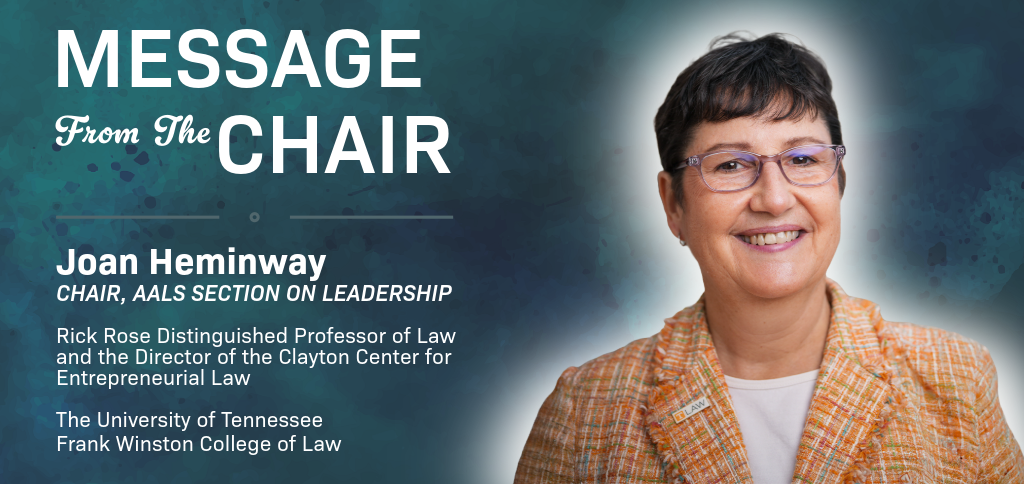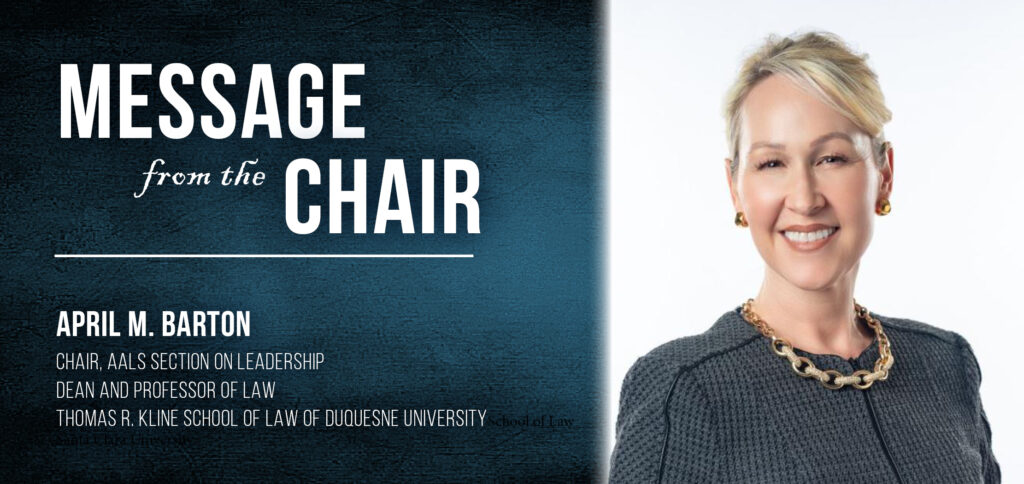
Dear AALS Leadership Section Members:
It hardly seems possible that I am completing my year as Chair of the Section on Leadership. It has been a great experience interacting with so many of you over the course of the year. The ideas all of you have shared in our sessions and by email have been so useful—even inspirational at times. Thanks so much for your many contributions and collaborations this year. I will write about only a few here.
I look forward to continuing to work with next year’s leadership team as we transition into the 2026 membership year. Although our elections will not formally take place until the AALS annual meeting in January, the section’s Nominations Committee—chaired by April Barton (a former section Chair) with support from fellow section Executive Committee members Tania Luma (our Chair-Elect) and Aric Short (our Secretary)—has done a masterful job organizing our Executive Committee elections in accordance with our new bylaws, approved by the AALS in the spring.
Since I last wrote, the section has offered a number of programs. Following the March webinar on Law Students Learning to Lead through Non-Profit Board Service (about which I wrote in the spring), our webinar series continued with programs in May (Advancing Lawyer Leadership: Why Scholarship Matters, organized and hosted by Executive Committee member Leah Teague), September (Adaptive Leadership Theory & Rule of Law as Resources in Challenging Times for Law & Legal Education, organized and hosted by Tania Luma), and November (Leadership Development and Professional Responsibility, hosted by Executive Committee member Kenneth Townsend). These forums continue to bring thoughtful, engaged ideas to the fore.
In July, in lieu of an additional webinar over the summer, Leah Teague organized and coordinated programming at the 2025 annual meeting of the Southeastern Association of Law Schools (SEALS). The discussion group on Leadership Development to Equip Lawyers for Success, Service, and Significance (moderated by Leah Teague) was quite lively. Although I had to miss them due to conflicts with other programs, I understand that the panel presentation on Teaching Civility and Civil Discourse as Leadership Development (also moderated by Leah) and the Demonstration of Professional Identity Formation Exercises (moderated by section member Jerry Organ) also stimulated much productive thought. Thanks so much, Leah for these opportunities to share wisdom. I hope we can organize a few programs for the 2026 SEALS annual meeting.
As I noted in my last newsletter message to you back in the spring, the Section on Leadership exists to support and promote your work on leading in and through law. Our role as legal educators and staff members offers us the opportunity to impact current and future law leadership (through teaching, scholarship, and service) in meaningful ways at a time when it seems critical to so many of us. Our AALS annual meeting program, Impact, Excellence, Resilience, and Professional Integrity: Educating Lawyers as Leaders, scheduled for Thursday, January 8 from 2:35 pm – 3:50 pm) focuses in on some of the related opportunities and challenges. In a discussion moderated by Tania Luma, our invited guests—the American Bar Association’s Immediate Past President (Bill Bay), the AALS’s current President (Austen Parrish), and two Fifth Circuit U.S. appellate court judges (James Graves and Corey Wilson)—will tackle the education of principled lawyer leaders in present times.
Please also note that our section business meeting is that morning (Thursday morning) from 7:30 am to 8:00 am. Our nominations committee has finalized a great set of nominees for election at the meeting. You should have received a separate communication on the elections through the listserv. If not, please contact me or another member of the section’s executive committee, and we will get that to you (and help to track down why you may not have received the initial message).
In addition, we are privileged to cosponsor a program at the 2026 AALS annual meeting (Doing Well-Being Without Losing Your Mind: An Interdisciplinary Approach to Law Student, Faculty, and Staff Well-Being) with the Section on Balance & Well-Being in Legal Education. That program is scheduled for 1:00 pm to 2:15 pm on Wednesday, January 7. As a wellness advocate and practitioner, I was grateful for the reach-out from the leadership of the Section on Balance and Well-Being requesting our support for this program.
Please remember that you can access significant amounts of information about the section (and about other matters relevant to section members) on the section’s webpage on the AALS website. For example, as many of you prepare for a new semester of teaching, I will take the opportunity to remind you that our section’s webpage offers access to syllabi for leadership courses, upcoming and past (recorded) webinars hosted by the section, and prior editions of this newsletter. The section’s webpage also includes a link to our section’s Bylaws and a subpage listing the names of and contact information for members of the section’s leadership. We do hope you will continue to reach out to us with your ideas for programming and resources.
I feel truly privileged to have had the opportunity to lead the Section on Leadership this past year. The journey has been rewarding, and I am inspired to continue it with all of you into and through the 2026 AALS membership year. In the interim, enjoy the holiday season. I hope to see many of you in New Orleans in January.
Best regards,
Joan














